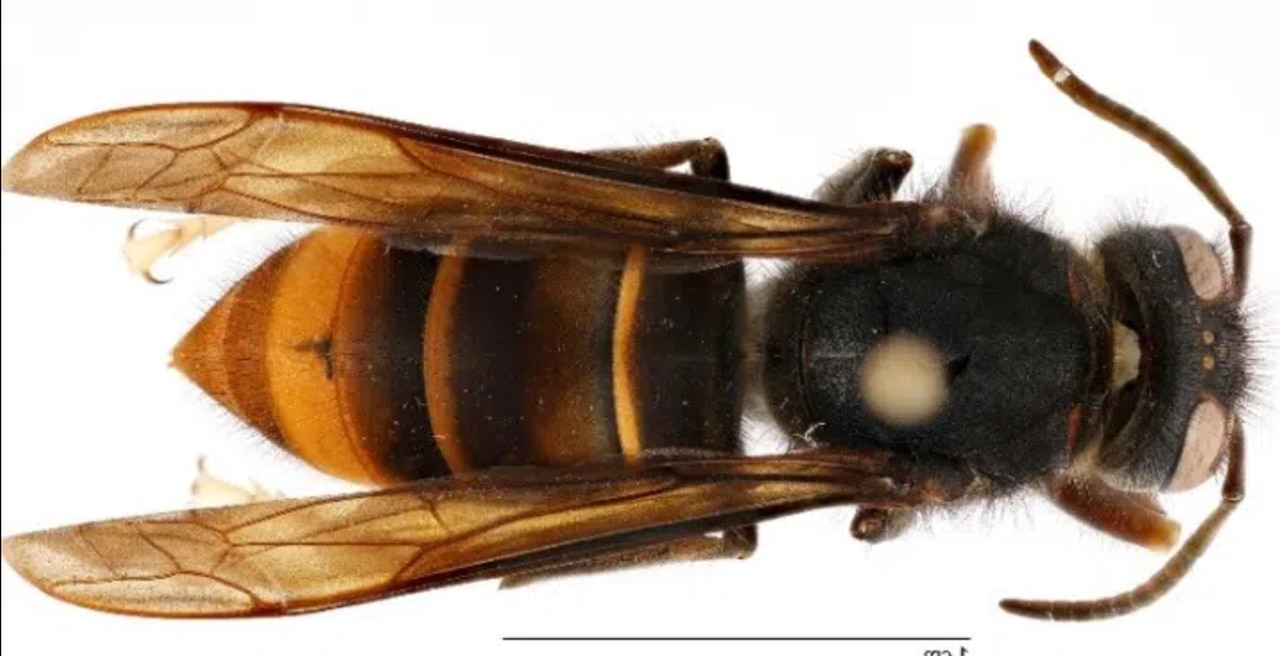Honeybee-eating âmurder hornetâ cousin never before seen in US appears in Georgia
A species of predatory hornet that feeds on honeybees and other insects has been found on U.S. soil in the wild for the first time in Georgia, officials with the state Department of Agriculture (GDA) and the University of Georgia announced Tuesday.
The extent of its proliferation in Georgia and beyond is not yet known, but officials and scientists warned that its arrival could pose a major threat to bees and, in turn, some of the state’s most valuable crops, which rely on pollinators for successful harvests.
“If established, this invasive species could threaten the native pollinators in our state and negatively impact our agricultural industry as a whole,” Agriculture Commissioner Tyler Harper said Tuesday.
Vespa velutina, also known as the yellow-legged hornet, is native to tropical regions of Southeast Asia, but has already spread to multiple regions in Europe, parts of the Middle East and other parts of Asia where it is not native. The hornet had long been identified by entomologists as having a high potential to invade the U.S. as well.
Two of the hornets were found by a beekeeper in Savannah earlier this month, who spotted the distinctive-looking insect on his property. The beekeeper notified the GDA, which enlisted UGA experts to help investigate. Scientists at UGA identified it as a yellow-legged hornet and on August 9, the U.S. Department of Agriculture (USDA) confirmed their assessment.
A colony has not been discovered yet, but the hornets’ nests typically house roughly 6,000 of the insects.
Harper thanked the beekeeper who reported the hornet and its partners at UGA and the USDA for helping to identify the insect. Harper said his agency and the USDA would be setting out traps to try to eradicate it from Georgia.
The winged pest is a close relative of the Northern giant hornet, another invasive species in the U.S., sometimes referred to as the “murder hornet” for its ability to ruthlessly dispatch honeybees. Several “murder hornets” were discovered in Washington state in 2019, leading to fears that the insects could decimate local honeybee populations. Fortunately, sightings have subsided and a citizen survey last year did not uncover any of the insects.
The yellow-legged hornet is smaller than its Northern cousin, but has a similarly voracious appetite for eating honeybees and other pollinators. The hornets can decimate an entire bee colony in a matter of hours.
Dr. Keith Delaplane, a honeybee expert in the University of Georgia’s Department of Entomology, said the hornet is similar in size to other species commonly found in Georgia, but can be distinguished from lookalikes by the bright yellow tips on the ends of its legs. Delaplane added that the insect is perhaps best identified by the aggressive aerial attacks it is known to wage on honeybees, which have earned it the nickname the “bee hawk.”
“The most important thing for beekeepers to do at this point is to be vigilant and look out for predatory behavior at their hive entrances,” Delaplane said.
The news of the hornet’s arrival in Georgia is unwelcome news for the state’s powerhouse agriculture industry. Honeybees in the state and around the globe are already in decline due to climate change, pesticide use, habitat loss and other human activity.
Pollinator-dependent crops, like blueberries and watermelons, are worth nearly $430 million annually in Georgia alone, Delaplane said. Georgia also consistently ranks among the top 20 states for honey production and in the top two or three for packaged bees used for beekeeping operations, UGA experts said.
Harper asked for the public’s help in documenting the insect.
The GDA website has posted a form for citizens to report potential sightings and the agency said Georgians with additional questions or concerns can email the department at [email protected].
A note of disclosure
This coverage is supported by a partnership with 1Earth Fund, the Kendeda Fund and Journalism Funding Partners. You can learn more and support our climate reporting by donating at ajc.com/donate/climate/
©2023 The Atlanta Journal-Constitution. Visit at ajc.com. Distributed by Tribune Content Agency, LLC.
